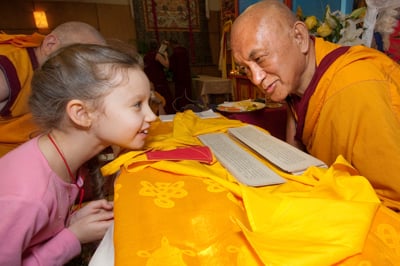[Some] parents do not know how to take care of, how to guide, how to bring up children. Ordinary people don’t know this—particularly in the West, but also in the East. There are many families who do know, but generally for people in the Western world it is a big problem. They do not know how to guide their children, how to bring up children.
What happens is that when children are young—whether their parents are a good influence or a bad influence, having bad conduct—they go to school where they meet other children and become friends with those children who take drugs or do many bad things which destroy them. Then they can’t have a proper education—it interferes with their education—and they can’t even do what normal people do in their lives, such as having a job and so forth, therefore it destroys their life.
When the children become friends with those other children, they do what their friends do. They start misbehaving or taking drugs, then their parents find it difficult to control them. That part is very difficult. Then even if the parents say, “Don’t do this, don’t do it because what happens is this,” they think their parents are their worst enemy and they run away. They think it’s better to leave home.
For example, one student’s nephew, [ran away] when he was young, thirteen years old. You know it is a common thing in the world—maybe not in every country, but in some of the countries—children think it’s very bad if the parents always say, “No,” and “Don’t do this.” The parents are their worst enemy in life, so they run away. I think that happens a lot. This thirteen-year-old boy left his family, but then after two or three years he remembered their kindness and he came back. Not everybody comes back by remembering their parents’ kindness, but he remembered their kindness and after two or three years he came back.
I think even for the government it is difficult, because the children are out of control after getting involved in drugs. Many people are put in prison, then the government finds it difficult. I know there are problems for people in the West, the young boys and girls.
Therefore, children need to follow their parents’ advice from a young age. If they have met Buddhadharma that is one thing—because that is very special, not so common—but even without that. The problem with computer games and so forth is that before there was much more time, but now their life is spent playing computer games. They are always on computer games or on their phones, etc. So there are many obstacles for education.
When children are not involved in those things, they can follow their parents’ advice well. If they are not involved in all those bad behaviors, which are an obstacle for peace and education, for pacifying obstacles, that is great, great. That is so, so helpful for the progress of peace and also it will bring so much peace.
Also, when they have children in the future, they will be able to guide their children in a similar way to how they were guided. This will help from generation to generation. It will help them to know how to guide their own children, to have happy lives and make their parents happy.
They will have a happy life, with much peace in their heart, besides success in education. They won’t become a disturbance for the world; they won’t become harmful to the world. They will become helpful.





























